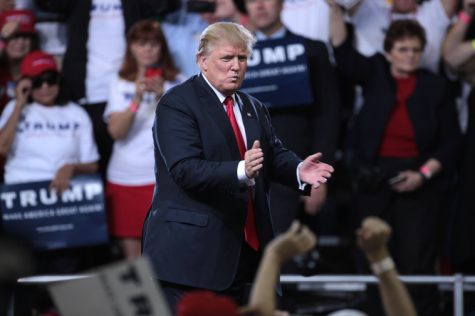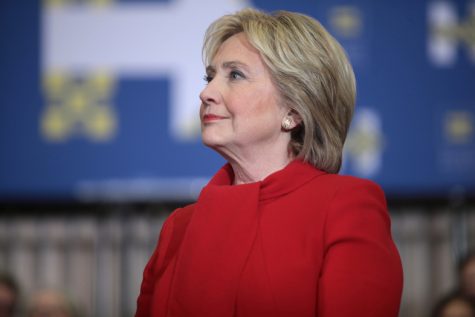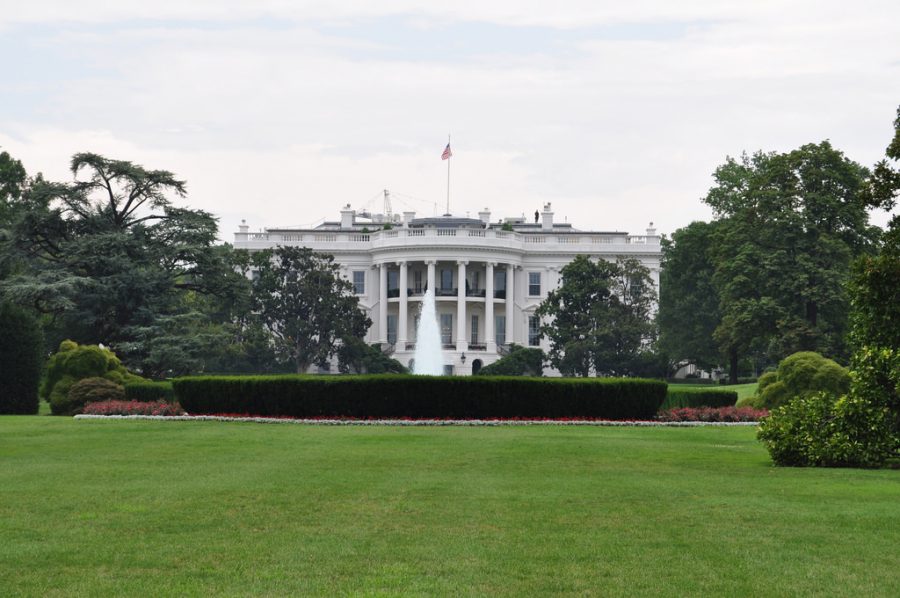Election 2016: A Nation Polarized
Hillary Clinton and Donald Trump are the major candidates in one of the most unique elections ever
Hillary Clinton and Donald Trump are locked in a race for the White House. Americans will decide which candidate will take the Oval Office in the general election on Nov. 8 after debates on Oct. 4 and Oct. 9.
September 28, 2016
DONALD TRUMP
Appeal
There has never been a presidential candidate quite like Donald Trump. The New York real estate billionaire declared that he was running for the Oval Office on June 15, 2015 and then embarked on one of the most controversial yet effective campaigns in the modern era. His rhetoric and attitude on the campaign trail has been called by many as “politically incorrect” but also resonates with some Americans, including his statistically verifiable base of white, middle-class Americans.
Trump’s focus has been on straight talk and rebuilding a country he believes to be in need of law and order. His ability to emerge from controversy with more support than ever is buoyed by his visibility – borne through prolific usage of social media and frequent interviews.
Trump’s fierce oratory and keen ability to tap into fears and certain issues of concern to many Americans have made him an attractive candidate.
Policies
Accused of being weak on policy, Trump’s strongest and certainly most talked-about policy reform centers

Donald Trump speaking with supporters at a campaign rally at Veterans’ Memorial Coliseum at the Arizona State Fairgrounds in Phoenix, Ariz.
on his immigration stance, delivered the day he announced his candidacy. Trump has delivered bold statements on deportation, including building an impenetrable wall along the Mexican-American border and he introduced a 10-point immigration plan in a speech delivered at the Phoenix Convention Center on Aug. 31. His speech included the declaration of a mass deportation policy within his first hour in office as President and has been met with criticism from opponents but high praise from his supporters.
Many times on the campaign trail, Trump has talked about what he considers a depletion of the military and the overall treatment of struggling veterans at home. He plans to invest in the military and try to make the military stronger than ever. For struggling veterans, Trump’s idea is for a Veterans Administration reform to help fix what many consider to be a broken system and give veterans the help they need.
Economically, Trump plans on revising the tax code and making it not only reasonable but favorable for businesses to invest and produce in the United States while strongly discouraging outsourcing.
Controversy
From the minute Trump announced his campaign he was besieged by a variety of detractors.
“When Mexico sends its people, they’re not sending their best,” Trump said while announcing his campaign at Trump Tower in June 2015. “They’re bringing drugs. They’re bringing crime. They’re rapists. And some, I assume, are good people.”
Combined with his campaign slogan, “Make America Great Again,” and what is often seen as doubling-down and inconsistency, certain remarks from Trump have sparked outcry from critics claiming he is bigoted and xenophobic. Many from the anti-Trump camp see his campaign slogan as a frightening throwback to the heyday of groups like the Ku Klux Klan – and accusations of a connection to former Grand Wizard David Duke is still seen as a bit murky even though Trump claims to have disavowed Duke.
From mocking a disabled journalist and making seemingly sexist comments towards Fox News journalist Megyn Kelly to supporting Britain’s exit from the United Nations, making derisive comments about the Khans, a Muslim family as well as a Gold Star family, and refusing to release his tax returns, Trump has engendered unprecedented controversy and resentment from his opponents including many Republicans.
What Supporters Are Saying
Tanner Jones is a local medical student Arizona State University and a massive Trump supporter.
“I’ve always been a fan of Donald Trump,” Jones said. “I admired him as a businessman…and the powerful companies he ran and owned.”
When asked what was most important to him when viewing Trump as a candidate, Jones pointed out Trump’s “America First” doctrine.
“The idea of what he calls ‘America First,’ which is the separation from this idea of globalism to a nationalist type of view where American culture, American economy and American security should come first from our federal government,” Jones said.
Jones believes Democratic candidate Hillary Clinton’s globalist view is not good for the United States.
“She kind of embodies this idea of globalism and putting others’ needs in front of our own,” Jones said.
Not all people voting for Trump are even necessarily fierce Trump supporters, as is the case for Jake McCarver, a petroleum engineering student from the University of Kansas.
“As a person who leans towards the conservative side of politics, I am naturally inclined to favor the Republican candidate,” McCarver said. “While I do not agree with all of his policies and or his plans to execute them, there are a few major issues, particularly in energy, that directly affect me and the industry that I plan to be a part of in the future.”
McCarver believes that Trump’s support for those working in the energy field differs from Clinton’s stance.
“Trump tends to support the industry as a whole,” he said. “He is not opposed to the development of the Bakken oil field in Canada. Trump has also said that ‘fracking will lead to America’s oil independence,’” McCarver said.
As for Clinton and her support of the field, McCarver thinks that her support for clean energy is bad news for people in his field.
***
HILLARY CLINTON
Appeal
Hillary Clinton’s political experience is vast and dates back to 1964, where she campaigned for Republican presidential nominee Barry Goldwater at the age of 17. In 1968, she went to embrace work in public service following a speech she heard in Chicago by Rev. Martin Luther King Jr. She became a registered Democrat later that year.
Clinton met her future husband and the future 42nd President, Bill Clinton, at Yale Law School. They went on to teach independently at the University of Arkansas Law School and were married in 1975.
Clinton would go on to aid the 1976 presidential campaign of Jimmy Carter and joined the Rose Law Firm in Little Rock, Ark., the year before her husband Bill would become Governor of Arkansas.
As the First Lady of Arkansas, Clinton chaired the Arkansas Educational Standards Committee, co-founded the Arkansas Advocates for Children and Families and served on the boards of the Arkansas Children’s Hospital, Arkansas Legal Services and the Children’s Defense Fund.
In the final years of Bill Clinton’s presidency, Hillary Clinton opted to run for New York’s Senate seat, which she won and held from 2000 to 2006. In 2007 Clinton announced her first presidential campaign. However, Barack Obama would bypass Clinton to become the 44th President. Clinton would then be nominated and appointed by President Obama to serve as Secretary of State between 2009 and 2013.
Policies
Strong and clear policy is perhaps Clinton’s strongest qualification and many supporters say it is the most significant reason why she should be Commander-in-Chief along with her experience in foreign policy global as former Secretary of State.
Clinton’s policies include aid for students and families with student debt.
“By 2021, families with income up to $125,000 will pay no tuition at in-state four-year public colleges and universities,” her website says. “And from the beginning, every student from a family making $85,000 a year or less will be able to go to an in-state four-year public college or university without paying tuition.”
Clinton will appoint Supreme Court justices who will protect Americans’ right to vote and curb the right of

Former Secretary of State Hillary Clinton speaking with supporters at a “Get Out the Caucus” rally at Valley Southwoods Freshman High School in West Des Moines, Iowa.
billionaires to buy elections. Also, she claims that she will also propose a constitutional amendment to overturn Citizens United within her first 30 days in office.
Clinton plans to defend and expand the Affordable Care Act, which covers 20 million people and many who were previously denied insurance before the Affordable Care Act. She has vowed to stand up to Republican-led attacks on this landmark law – and build on its success to bring the promise of affordable healthcare to include more people and to make a “public option” possible. She will also support letting people over 55 buy into Medicare.
Controversy
Following the conclusion of the 2016 Democratic National Convention in Philadelphia, Clinton could not have looked stronger, having dodged persistent attacks on her credibility and transparency regarding her private email server and the emails exchanged via Clinton to outside parties during her tenure as Secretary of State between 2009 and 2013.
Despite the scrutiny that dogged the primary campaign, Clinton would go on to become the Democratic Party’s 2016 presidential candidate and the first female candidate elected by a major party, beating out the self-proclaimed “democratic socialist,” Vermont Senator Bernie Sanders.
Sen. Sanders’ progressive policies captured the imagination of millennials with his promises of debt-free college, the repeal of Citizens United and safeguarding Medicare. Sanders took the lead among millennials who saw Clinton as the ultimate insider, but Clinton aligned with much of Sanders’ platform and is well aware that she must appeal to Sanders’ base.
Between the conclusion of the Republican National Convention in Cleveland and the beginning of the Democratic National Convention, WikiLeaks published emails from the DNC showing staffers suggesting attacks on Sanders’ religion and bias from the Conventions Chairwoman, Debbie Wasserman Schultz. The DNC and the Clinton campaign deny allegations of conspiring against the Sanders campaign.
What Supporters Are Saying
It is rare for a sitting President to endorse a candidate as much as President Barack Obama has for Clinton.
“There has never been a man or a woman more qualified than Hillary Clinton to serve as president of the United States of America,” Obama said at the Democratic National Convention.
Katlyn Seems, 21, is a full-time student and one of those millennials who was moved by Sanders. But despite her feelings toward Sanders, she is voting for Clinton and condemns the “Bernie or Bust” movement, finding their action detrimental to the election.
“It sucks ‘cause I can’t tell people who to vote for, but it’s just unrealistic to write in Bernie Sanders,” Seems said. “He won’t win and will only hurt Hillary and help Trump.”
Philip Day, 42 is an independent contractor who considers himself an independent voter and holds a different view on Hillary Clinton’s email scandal,
“Is it suspicious? Sure,” Day said. “But it’s just not illegal. And like Trump hasn’t done anything shady? The man has openly stated he’s bought politicians, I think that’s kind of shady.”
Day said the decision to vote for Clinton this November was a simple one.
“This election was easy for me. Just off composure alone, Hillary is just miles ahead.” Day said. “Trump is just too thin-skinned. I’ve heard pundits say something along the lines of how ‘Trump’s been baited by tweets’ and that’s not the way I want to go out.”


